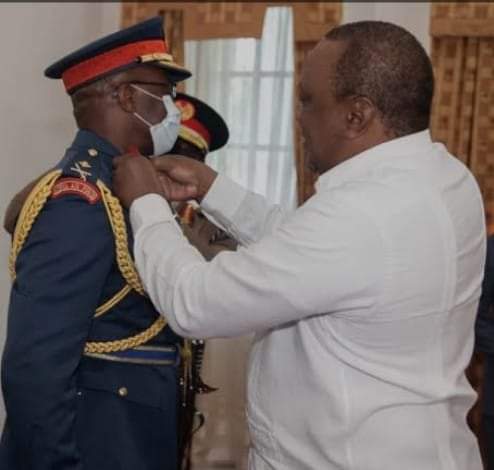Siaya Senator Oburu Odinga has revealed why Former President Uhuru Kenyatta and former Prime Minister Raila Odinga did not attend the burial of Chief of Defence Forces General Francis Omondi Ogolla.Speaking during the burial at Senator Obama K’Ogello Primary School, Siaya county, Oburu said the Former President was out of the country and was therefore unable to attend the burial.
“I bring condolences of the former president Uhuru Kenyatta. He is out of the country and has asked me to bring his condolences to the family,” he saidOn his younger brother, Raila, Oburu said the ODM leader was indisposed and thus he sent him to represent him and the larger Jaramogi Oginga Odinga family.
“I am also here to bring the condolences of my brother Raila who has sent me here because he is a bit indisposed. He could not come personally and he has therefore asked me to come personally to represent him,” he said.Raila, however, attended the memorial service staged at the Ulinzi Sports Complex on Saturday during which he also passed his condolence message.
The two leaders were conspicuously missing during the burial service raising eyebrows among Kenyans considering General Ogolla worked closely with them at some time in his career.During the era of Former President Uhuru, General Ogolla was the Vice Chief of Defence Forces.General Ogolla is being laid to rest this Sunday, three days after he lost his life in a plane crash in West Pokot.
President William Ruto is leading senior government officials in the send-off of the CDF Ogolla whom he promoted to a four-star general and Chief of Defence Forces.While explaining why he named Ogolla CDF, Ruto said he was convinced by his competency in appointing him to the role.“I made a conscious decision that we are going to take a different trajectory as a country where merit, professionalism and competency must come before ethnicity.
I made up my mind that General Ogolla deserved to be CDF,” he stated.Ruto said that within the short period, Ogolla was the Chief of Defence Forces, he made a huge difference.From where I sit with the amount of information I get, General Ogalla made a very big difference in his leadership, the fact that he could reach out to all actors, the synergy he had built with the police and all the other arms was just on a different level,” he added.
The absence of President Uhuru Kenyatta and former Prime Minister Raila Odinga at General Ogolla’s burial, with Oburu Odinga stating that the former president was out of the country, underscores a complex interplay of factors within Kenyan politics, cultural norms, and personal commitments. To dissect this situation comprehensively, we need to delve into the dynamics of Kenyan politics, the relationship between the individuals involved, the significance of funerals in Kenyan culture, and the broader context of international engagements.
Kenyan politics is characterized by intricate networks of alliances, rivalries, and strategic calculations. Both President Kenyatta and former Prime Minister Odinga hold significant political stature and wield considerable influence over their respective constituencies. However, their relationship, once marked by political contention, has evolved into a more cooperative framework, particularly following the handshake agreement in 2018.
Despite this rapprochement, political considerations undoubtedly factor into their decisions regarding public appearances, including attendance at funerals.Funerals hold immense cultural significance in Kenya, often serving as communal gatherings where social, cultural, and political bonds are reinforced. The presence or absence of prominent figures at such events can carry symbolic weight, signaling alliances, respect, or indifference.
Consequently, the decision of whether to attend a funeral is often scrutinized within the context of political messaging and optics.Oburu Odinga’s statement regarding President Kenyatta’s absence due to international travel adds another layer to the narrative. As heads of state, both domestic and international commitments demand their attention, often requiring them to balance competing priorities.
In this context, President Kenyatta’s absence may be interpreted as a reflection of the demands of his official duties rather than a deliberate snub.Raila Odinga’s non-attendance raises similar questions. As a key opposition figure turned political partner, his presence or absence at such events can carry significant symbolic weight. However, his absence may be attributed to a range of factors, including scheduling conflicts, health considerations, or personal commitments.
Moreover, the absence of both leaders could be interpreted through the lens of shifting political dynamics. The handshake agreement between Kenyatta and Odinga signaled a willingness to transcend partisan divides for the sake of national unity and stability. However, the implementation of this agreement has faced challenges, with critics questioning its efficacy and sincerity. Against this backdrop, the absence of both leaders at a prominent event like General Ogolla’s burial may reignite speculation about the durability of their political alliance and the extent of their cooperation.
Additionally, it’s essential to consider the broader context of international engagements. As Kenya continues to position itself as a regional leader and global player, President Kenyatta’s overseas trips are not uncommon. These engagements serve various purposes, including diplomatic relations, trade agreements, and participation in international forums. Thus, his absence at General Ogolla’s burial may be a reflection of Kenya’s broader foreign policy objectives rather than a personal choice.
The absence of President Kenyatta and former Prime Minister Odinga at General Ogolla’s burial reflects a complex interplay of political, cultural, and personal factors. While their non-attendance may raise eyebrows and spark speculation, it’s crucial to consider the myriad influences shaping their decisions. Ultimately, their absence underscores the multifaceted nature of Kenyan politics and the delicate balance between public duties, personal commitments, and broader strategic considerations.
Furthermore, the absence of President Kenyatta and former Prime Minister Odinga at General Ogolla’s burial may also reflect the evolving nature of Kenyan politics and the changing dynamics within their respective parties. Both leaders are likely navigating internal party politics, balancing the expectations of party loyalists, grassroots supporters, and coalition partners. Their decisions regarding public appearances, including attendance at funerals, may be influenced by these internal dynamics as much as by broader political considerations.
Moreover, the absence of high-profile politicians at funerals is not unprecedented in Kenyan politics. While funerals serve as important communal events, they are also subject to pragmatic considerations, such as security concerns, logistical challenges, and the need to manage public appearances strategically. Therefore, while the absence of President Kenyatta and former Prime Minister Odinga may spark speculation and commentary, it is essential to contextualize their non-attendance within the broader framework of political exigencies and logistical constraints.
The absence of President Kenyatta and former Prime Minister Odinga at General Ogolla’s burial reflects a confluence of factors, including political calculations, cultural norms, personal commitments, and logistical considerations. While their non-attendance may be subject to interpretation and analysis, it underscores the complexity of Kenyan politics and the myriad influences shaping the decisions of its key actors.

